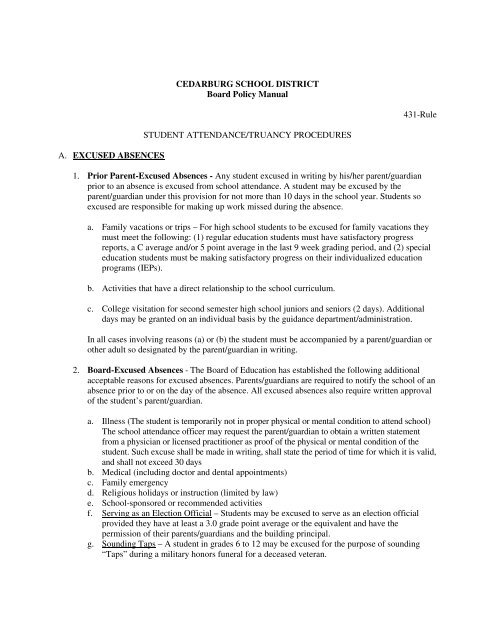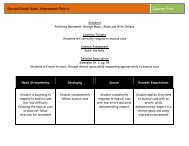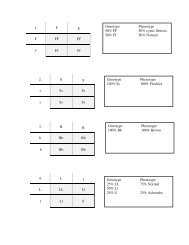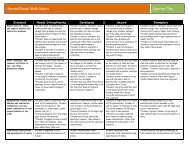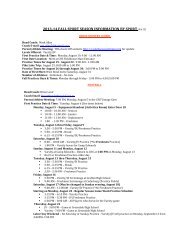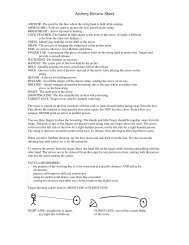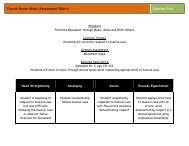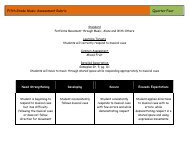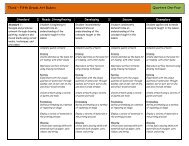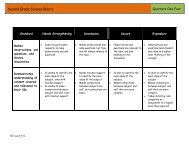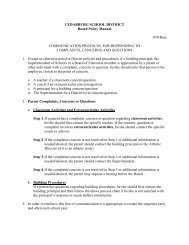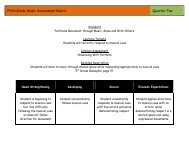Student Attendance/Truancy Procedures - Cedarburg School District
Student Attendance/Truancy Procedures - Cedarburg School District
Student Attendance/Truancy Procedures - Cedarburg School District
Create successful ePaper yourself
Turn your PDF publications into a flip-book with our unique Google optimized e-Paper software.
CEDARBURG SCHOOL DISTRICT<br />
Board Policy Manual<br />
431-Rule<br />
A. EXCUSED ABSENCES<br />
STUDENT ATTENDANCE/TRUANCY PROCEDURES<br />
1. Prior Parent-Excused Absences - Any student excused in writing by his/her parent/guardian<br />
prior to an absence is excused from school attendance. A student may be excused by the<br />
parent/guardian under this provision for not more than 10 days in the school year. <strong>Student</strong>s so<br />
excused are responsible for making up work missed during the absence.<br />
a. Family vacations or trips – For high school students to be excused for family vacations they<br />
must meet the following: (1) regular education students must have satisfactory progress<br />
reports, a C average and/or 5 point average in the last 9 week grading period, and (2) special<br />
education students must be making satisfactory progress on their individualized education<br />
programs (IEPs).<br />
b. Activities that have a direct relationship to the school curriculum.<br />
c. College visitation for second semester high school juniors and seniors (2 days). Additional<br />
days may be granted on an individual basis by the guidance department/administration.<br />
In all cases involving reasons (a) or (b) the student must be accompanied by a parent/guardian or<br />
other adult so designated by the parent/guardian in writing.<br />
2. Board-Excused Absences - The Board of Education has established the following additional<br />
acceptable reasons for excused absences. Parents/guardians are required to notify the school of an<br />
absence prior to or on the day of the absence. All excused absences also require written approval<br />
of the student’s parent/guardian.<br />
a. Illness (The student is temporarily not in proper physical or mental condition to attend school)<br />
The school attendance officer may request the parent/guardian to obtain a written statement<br />
from a physician or licensed practitioner as proof of the physical or mental condition of the<br />
student. Such excuse shall be made in writing, shall state the period of time for which it is valid,<br />
and shall not exceed 30 days<br />
b. Medical (including doctor and dental appointments)<br />
c. Family emergency<br />
d. Religious holidays or instruction (limited by law)<br />
e. <strong>School</strong>-sponsored or recommended activities<br />
f. Serving as an Election Official – <strong>Student</strong>s may be excused to serve as an election official<br />
provided they have at least a 3.0 grade point average or the equivalent and have the<br />
permission of their parents/guardians and the building principal.<br />
g. Sounding Taps – A student in grades 6 to 12 may be excused for the purpose of sounding<br />
“Taps” during a military honors funeral for a deceased veteran.
h. Any absences not categorized above may be discussed with the building principal or designee<br />
and excused as deemed appropriate.<br />
Absence from school during a period of suspension or expulsion will be considered an excused<br />
absence for purposes of these procedures.<br />
<strong>Student</strong>s with excused absences are responsible for the work they miss while absent from school.<br />
Assignments may be obtained from teachers prior to the absence or upon the student's return. All<br />
tests and assignments missed during the absence must be made up within a reasonable mutually<br />
agreeable time after the student returns to class.<br />
B. SPECIAL STUDENT EXEMPTIONS FROM SCHOOL ATTENDANCE<br />
1. Upon a student's notification of the Board, and with written approval of the student's<br />
parent/guardian, any student who is 16 years of age or over and a child at risk, may attend a<br />
technical college in lieu of high school or on a part time basis. The student and his/her<br />
parent/guardian must agree, in writing, that the student will participate in a program or curriculum<br />
modification leading to the student's high school graduation.<br />
2. Upon a student's request, and with written approval of the student's parent/guardian, any student<br />
who is 16 years of age or over may be excused by the Board from regular school attendance if the<br />
student and his/her parent/guardian agree, in writing, that the student will participate in a program<br />
or curriculum modification leading to the student's high school graduation.<br />
3. Upon a student's request, and with written approval of the student's parent/guardian, any student<br />
who is 17 years of age or over may be excused by the Board from regular school attendance if the<br />
student and his/her parent/guardian agree, in writing, that the student will participate in a program<br />
or curriculum modification leading to the student's high school graduation or leading to a high<br />
school equivalency diploma.<br />
Prior to a student's admission to a program leading to the student's high school graduation or a high<br />
school equivalency program under (2) and (3) above, the student, his/her parent/guardian, the Board<br />
and a representative of the high school equivalency program or program leading to the student's<br />
high school graduation shall enter into a written agreement. The written agreement shall state the<br />
services to be provided, the time needed to complete the high school equivalency program or<br />
program leading to high school graduation, and how the performance of the student will be<br />
monitored. The agreement shall be monitored by the Board on a regular basis, but in no case shall<br />
the agreement be monitored less frequently than once per semester. If the Board determines that a<br />
student is not complying with the agreement, the Board shall notify the student, his/her<br />
parent/guardian and the high school equivalency program or program leading to the student's<br />
high school graduation that the agreement may be modified or suspended in 30 days.<br />
4. Upon a student's request and with the approval of the student's parent/guardian, any student who is<br />
17 years of age or over shall be excused from regular school attendance if the student began a<br />
program leading to a high school equivalency diploma in a secured correctional facility or a secured<br />
child caring institution and the student and his/her parent/guardian agree, in writing, that the student<br />
will continue to participate in the program.<br />
Prior to a student's admission to a program leading to the student's high school equivalency, the<br />
student, his/her parent/guardian, the Board and a representative of the agency providing the program<br />
shall enter into a written agreement. The agreement shall specify that the student is excused from
egular school attendance while he/she is enrolled in the program and making progress toward<br />
completion of the program, or successfully completes the program. If the agency providing the<br />
program determines the student is not making progress toward completion of the program, the<br />
agency shall notify the student and his/her parent/guardian that the agreement may be suspended<br />
within 30 days. If the agency suspends the agreement, the agency shall notify the student, his/her<br />
parent/guardian and the Board.<br />
5. Any student's parent/guardian, or the student if the parent/guardian is notified, may request the<br />
Board, in writing, to provide the student with program or curriculum modifications, including but<br />
not limited to:<br />
a. Modifications within the student's current academic program.<br />
b. A school work training or work study program.<br />
c. Enrollment in an alternative public school or program located in the <strong>District</strong>.<br />
d. Enrollment in any nonsectarian private school or program located in the <strong>District</strong>.<br />
e. Homebound study, including nonsectarian correspondence courses or other courses of study<br />
approved by the Board or nonsectarian tutoring provided by the school in which the student is<br />
enrolled.<br />
f. Enrollment in any public educational program located outside the <strong>District</strong>.<br />
Program and curriculum modifications shall be requested and approved in accordance with state<br />
law and established <strong>District</strong> procedures. Any decision made in response to the request for program<br />
or curriculum modifications shall be reviewed by the Board upon request of the student’s<br />
parent/guardian. The Board shall render its determination upon review, in writing, if requested by<br />
the student’s parent/guardian.<br />
C. UNEXCUSED ABSENCES/TRUANCY<br />
<strong>Student</strong>s with unexcused absences shall be considered truant and shall be dealt with in accordance<br />
with the following procedures:<br />
1. <strong>Truancy</strong> - The school attendance officer shall notify the parent/guardian of a student who has<br />
been truant of the student’s truancy and direct the parent/guardian to return the student to school<br />
no later than the next day on which school is in session or to provide an excuse. “<strong>Truancy</strong>”<br />
means any absence for part or all of one or more school days during which the school has not<br />
been notified of the legal cause of such absence by the parent/guardian of the absent student, and<br />
also means intermittent attendance carried on for the purpose of defeating the intent of the<br />
compulsory attendance law. The truancy notification may be made by personal contact, mail or<br />
telephone call of which a written record is kept. Notice by personal contact or telephone call shall<br />
be attempted before notification by mail may be given.<br />
a. High school students with unexcused absences will be assigned to a supervised study<br />
program during school, before school, after school or on Saturday for the purpose of making<br />
up missed work from the unexcused absence(s). The time assigned will be determined by the<br />
high school administration and will have a direct relationship to the amount of time and<br />
amount of work missed.<br />
b. It is recommended that for any student who is truant, a meeting be held with the student’s<br />
parent(s)/guardian, building principal, counselor, teachers and/or others deemed appropriate.<br />
The purpose of the meeting will be to consider possible curriculum modifications,<br />
motivational techniques, evaluation including assessment for possible learning or social<br />
problems, or other intervention that might result in regular school attendance. If it is
determined that the family is in crisis and/or in need of counseling, then the school should<br />
provide said counseling or refer the family to the Ozaukee County Health and Family<br />
Services Department, Department of Community Programs, or other appropriate resource.<br />
<strong>School</strong> personnel should check with the parents/guardians within 48 hours to determine if the<br />
family has followed up on counseling. If not, the family should be aggressively encouraged to<br />
do so.<br />
c. If parents/guardians are uncooperative, the assistance of a Juvenile Court intake worker may<br />
be requested. The intake worker will send out a registered letter to the student’s<br />
parents/guardians explaining the legal consequences for failure to cooperate with the school<br />
regarding their student’s absenteeism. If parents/guardians fail to respond to the intake<br />
worker, a referral will be made to either the local police department or Ozaukee County<br />
Sheriff's Department for the issuance of a citation for contributing to truancy.<br />
2. Habitual <strong>Truancy</strong><br />
a. A notice must be sent to the student’s parent or guardian by registered or certified mail when<br />
the student initially becomes a habitual truant. “Habitual truant” means a student who is<br />
absent from school without an acceptable excuse for part or all of five or more days on which<br />
school is held during a semester. The notice shall include the following:<br />
(1) A statement of the parent's/guardian's responsibility under state law to cause the student<br />
to attend school regularly.<br />
(2) A statement that the parent/guardian or student may request program or curriculum<br />
modifications for the student and that the student may be eligible for enrollment in a<br />
program for children at risk.<br />
(3) A request that the parent/guardian meet with appropriate school personnel to discuss the<br />
student's truancy. The notice must include the name of the school personnel with whom<br />
the parent/guardian should meet; a date, time and place for the meeting; and the name,<br />
address and telephone number of a person to contact to arrange a different date, time or<br />
place. The date for the meeting must be within five school days after the date that the<br />
habitual truancy notice has been sent to the student’s parent/guardian. With the consent of<br />
the student’s parent/guardian, however, the date for the meeting may be extended for an<br />
additional five school days.<br />
(4) A statement of the penalties that may be imposed under state law on the parent/guardian<br />
if he/she fails to cause the student to attend school regularly.<br />
b. <strong>School</strong> personnel must notify a truant student’s parent/guardian of any additional unexcused<br />
absences that occur after the required notice in item C-2(a). The same procedure listed under<br />
C-1 will be followed.<br />
c. Prior to any proceeding being brought against a student or against the student’s<br />
parent/guardian under the compulsory attendance law, the school attendance officer must<br />
provide evidence that appropriate school personnel have, within the school year during which<br />
the truancy occurred, done all of the following:<br />
(1) Met with the student's parent/guardian to discuss the student's truancy or attempted to<br />
meet with the student's parent/guardian and received no response or were refused. This<br />
requirement does not apply if the meeting with the parent/guardian is not held within 10<br />
school days after the date that the habitual truancy notice is sent.<br />
(2) Provided an opportunity for educational counseling to the student to determine whether a<br />
change in the student's curriculum would resolve the student's truancy, and have
considered curriculum modifications.<br />
(3) Evaluated the student to determine whether learning problems may be a cause of the<br />
student's truancy and, if so, have taken steps to overcome the learning problems. The<br />
student need not be evaluated if tests administered to the student within the previous year<br />
indicate that the student is performing at his/her grade level.<br />
(4) Conducted an evaluation to determine whether social problems may be a cause of the<br />
student's truancy and, if so, have taken appropriate action or made appropriate referrals.<br />
Items (2), (3) and (4) above do not apply if the school attendance officer provides evidence<br />
that appropriate school personnel were unable to carry out the activity due to the student's<br />
absences from school.<br />
If the steps outlined above have been followed, a legal referral may be made.<br />
d. A completed “Ozaukee County <strong>Truancy</strong> Referral” form and “Truant <strong>Student</strong> Profile” will be<br />
sent to the Ozaukee County Department of Health and Family Services. A copy of all forms<br />
will be kept by the school. The truancy referral will be handled as follows:<br />
(1) A juvenile court intake worker shall be assigned to handle the truancy referral.<br />
(2) If the referring school attendance officer has followed the procedures noted above, the<br />
intake worker will make either a referral for the issuance of a citation or a referral to the<br />
Corporation Counsel within five working days of being assigned.<br />
(3) If the Corporation Counsel believes the referral form is sufficiently completed, he/she<br />
will file a petition with Juvenile Court within five working days of receiving the referral.<br />
(4) A court hearing(s) will be held, with the following possible Juvenile Court dispositions:<br />
Counsel and release<br />
Consent decree with specific rules (6 months)<br />
Supervision with specific rules (12 months)<br />
Placement in alternate care (foster home, group home, institution)<br />
Participation in a counseling program<br />
Suspension of student’s operating privilege for not less than 30 nor more than 90<br />
days<br />
Participation in community service or supervised work<br />
Home detention<br />
<strong>Student</strong> ordered to attend a program for children at risk<br />
<strong>Student</strong> ordered to attend educational program pursuant to a contractual agreement<br />
with the <strong>District</strong> in which the student resides and a licensed child welfare agency, a<br />
private, non-profit non-sectarian agency or a vocational school located in the <strong>District</strong><br />
in which the student resides.<br />
(5) The Court shall order the mutual disclosure of records between the school and the<br />
Department of Health and Family Services as is necessary to assure the provision of<br />
appropriate educational services. (A copy of this order will be sent to the building<br />
principal by the assigned intake worker.)<br />
(6) Once the Court imposes one of the aforementioned dispositions, the school attendance<br />
officer shall notify the student’s parents/guardians and the assigned social worker (as<br />
appropriate) within 24 hours of any subsequent unexcused absences by the student.<br />
(7) If a juvenile student continues to be truant in violation of the court order, the juvenile will<br />
be brought back to Court for imposition of one of the aforementioned dispositions and/or<br />
be given a warning for contempt of court.
D. CONTINUED INTERVENTIONS AFTER REFERRAL TO INTAKE<br />
If truancy continues to exist, the Ozaukee County Juvenile Court will assume responsibility for<br />
future interventions.<br />
CROSS REF.: 347-Rule, Guidelines for the Maintenance and Confidentiality of <strong>Student</strong> Records<br />
431, <strong>Student</strong> <strong>Attendance</strong><br />
431-Exhibit, Notification of Habitual <strong>Truancy</strong><br />
APPROVED IN PART: May 15, 1989<br />
REVISED: February 18, 1997<br />
August 26, 2004


